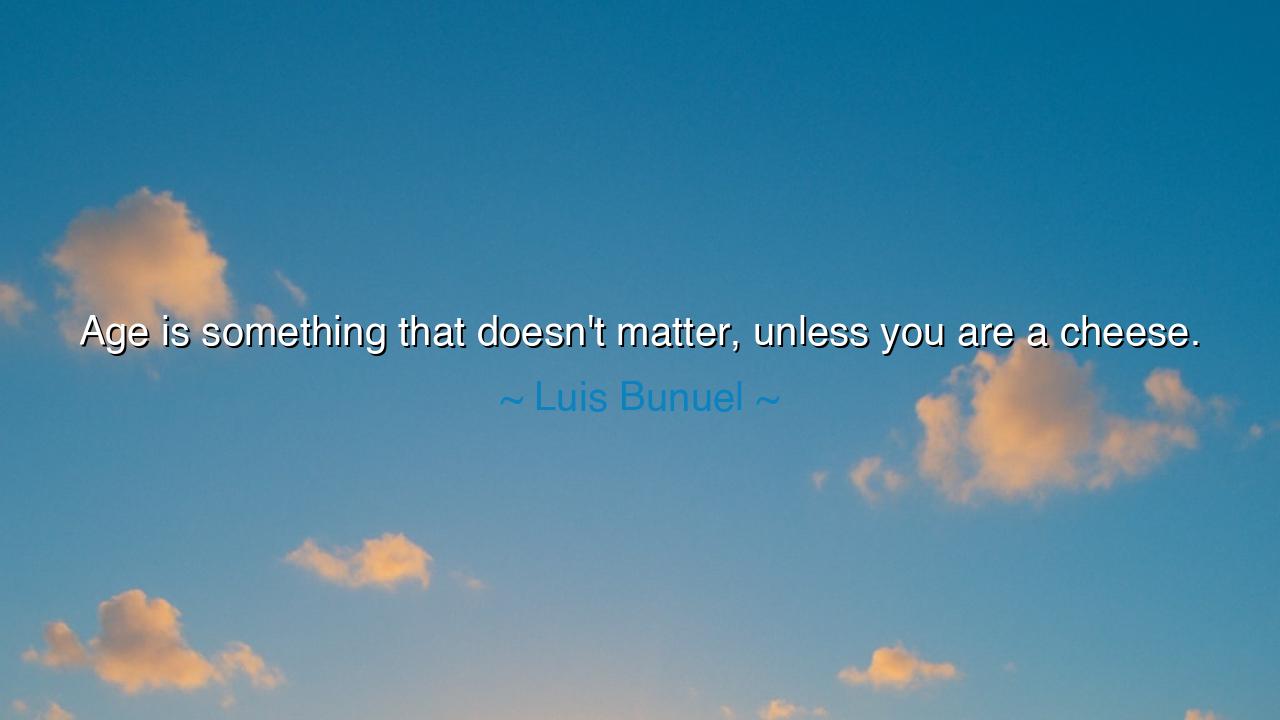
Age is something that doesn't matter, unless you are a cheese.






Gather, O children of wisdom, for the words of Luis Buñuel carry a delightful paradox, one that speaks not only to the fleeting nature of age but to the very essence of human existence: “Age is something that doesn't matter, unless you are a cheese.” In these words, Buñuel reminds us that age is but a measure of time, a mere numerical marker that holds weight only in certain contexts—like that of cheese, where age brings a refined depth of flavor. But for human beings, age does not define the value of life or the quality of experience. Age, in its deepest sense, is merely the passage of time; it is the soul, the spirit, and the choices we make that truly matter.
In the ancient world, the philosophers often debated the nature of time and change. Heraclitus spoke of the ever-changing river, claiming that one could never step into the same river twice. This reflects the truth that time—like the river—is a constant flow, bringing change to all that it touches. Yet, in the wisdom of the Greeks, they understood that the value of a life was not to be found in the number of years but in the depth of experience, in the wisdom gained, and in the virtue cultivated. Socrates lived to an old age not because he clung to his youth, but because he embraced the unfolding of his life, ever seeking knowledge, ever questioning, and ever refining his soul. The Greeks understood that age was merely a chronological reality, but it was the quality of the journey—the choices, the thoughts, and the actions—that defined the worth of a person’s life.
In the Roman world, figures such as Cicero and Seneca echoed these beliefs. Cicero, in his reflections on old age, accepted the passing of time with grace, not as a curse but as a reward for a life well-lived. To Cicero, the aging process was not to be feared, but to be understood as part of the human experience, a transition toward deeper reflection and a more peaceful state of being. Seneca, in his writings on the brevity of life, urged people not to count the years but to live each moment fully and with purpose. For both of these wise men, age was something that happened to the body, but did not need to happen to the mind or spirit. Age could enhance the depth of a life if it was met with purpose and wisdom.
Consider the example of Leonardo da Vinci, whose mind remained vibrant and curious well into his later years. Though his body grew weaker, his capacity for innovation, learning, and creation did not diminish. Da Vinci, like Buñuel’s paradoxical cheese, became more profound with age—not because time had aged him, but because he had spent his life exploring the boundaries of human knowledge, always evolving. His later years were marked by reflection, where his many discoveries—ranging from art to anatomy—came together to form a more complete understanding of the world. His life teaches us that, like a great wine or cheese, it is not the passage of time that matters, but the journey we take and how we use the time granted to us.
Buñuel’s words also remind us that youth is often overemphasized in our modern world. We place so much value on the youthful years—on beauty, strength, and vitality—that we forget the treasure found in the later years of life. Youth may be fleeting, but it is the experiences we have, the wisdom we gather, and the relationships we build that shape the value of our lives. Just as age is irrelevant to the cheese, it should be irrelevant to us. The measure of our worth is not in how young or old we are, but in the depth of the life we lead, the virtue we pursue, and the purpose we fulfill in the time that we have.
The lesson from Buñuel’s quote is this: age is not something to fear, nor is it something to be obsessed over. It is the quality of life that matters. Like fine cheese or wine, age can deepen and enrich the soul, if lived with intention. Youth may bring its own vitality, but old age, when lived well, brings the reward of wisdom, peace, and an understanding of the deeper truths of life. Life is not measured by the number of years but by the depth of the moments lived, the choices made, and the wisdom gained along the way.
In your own life, remember that it is not your age, but the purpose with which you live, that defines the value of your existence. Do not rush through the years chasing after fleeting beauty or youthful vigor. Instead, let each year bring you closer to wisdom, closer to peace, and closer to your true self. Like the great philosophers and the innovators who defied age, see each year as an opportunity to grow, to learn, and to create something of lasting value. Age, like a batch of letters, is simply the unfolding of a journey, and it is not the number of years that matters but the richness of the experience. So, live fully, live wisely, and embrace the gift of time at every stage.






AAdministratorAdministrator
Welcome, honored guests. Please leave a comment, we will respond soon